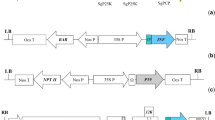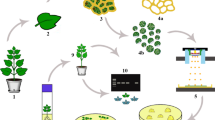Abstract
The gene encoding a single-chain, ribosome-inactivating protein (SCRIP) was cloned from bitter melon (Momordica charantia L.) leaves infected with the fungus, Sphaerotheca fuliginea, by RT-PCR. The ORF was 861 bp. The ribosome-inactivating protein was expressed in E. coli and, when purified, it inhibited the growth of the Sphaerotheca fuliginea in vitro. Northern blot analysis revealed that RIP transcripts rapidly accumulated in leaves 1-day post inoculation with Sphaerotheca fuliginea and reached a peak at 3 d. The expression pattern of RIP induced by methyl jasmonate and salicylic acid were different from that of pathogen-induced expression. Mechanical wounding, silver nitrate and osmotic stress stimulated only a slight accumulation of RIP transcripts. Abscisic acid also induced transcription of RIPs. The signal compounds, ethylene and okadaic acid, induced a moderate accumulation of RIP transcripts.







Similar content being viewed by others
References
Barbieri L, Battelli MG, Stirpe F (1993) Ribosome-inactivating proteins from plants. Biochim Biophys Acta 1154:237–282
Bowles DJ (1990) Defense-related proteins in higher plants. Annu Rev Biochem 59:873–907
Church GM, Gilbert W (1984) Genomic sequence. Proc Natl Acad Sci 81:1991–1995
Dong X (1998) SA, JA, ethylene, and disease resistance in plants. Curr Opin Plant Biol 1:316–323
Hong Y, Saunders K, Hartley MR, Stanley J (1996) Resistance to geminivirus infection by virus-induced expression of dianthin in transgenic plants. Virology 220:119–127
Hunter T, Karin M (1992) The regulation of transcription by phosphorylation. Cell 70:375–387
Iuchi S, Kobayashi M, Taji T, Naramoto M, Seki M, Kato T, Tabata S, Kakubari Y, Yamaguchi-Shinozaki K, Shinozaki K (2001) Regulation of drought tolerance by gene manipulation of 9-cis-epoxycarotenoid dioxygenase, a key enzyme in abscisic acid biosynthesis in Arabidopsis. Plant J 27:325–333
Lee-Huang S, Huang PL, Chen H-C, Huang PL, Bourinbaiar A, Huang HI, Kung H-F (1995) Anti-HIV and anti-tumor activities of recombinant MAP30 from bitter melon. Gene 161:151–156
Leon J, Rojo E, Sanchez-Serrano JJ (2001) Wound signaling in plants. J Exp Bot 52:1–9
Liu JJ, Ekramoddoullah AKM, Yu X (2003) Differential expression of multiple PR10 proteins in western white pine following wounding, fungal infection and cold-hardening. Physiol Plant 119:544–553
Mohamed Y, Bardin M, Nicot P (1995) Causal agents of powdery mildew of cucurbits in Sudan. Plant Disease 79:634–636
Moon YH, Song SK, Choi KW, Lee JS (1997) Expression of a cDNA encoding Phytolacca insularis antiviral protein confers virus resistance on transgenic potato plants. Mol Cells 7:807–815
Pan R, More T (1996) Screening of melon (Cucumis melo L.) germplasm for multiple disease resistance. Euphytica 88:125–128
Peumans WJ, Hao Q, Van Damme EJ (2001) Ribosome-inactivating proteins from plants: more than RNA N-glycosidases? FASEB J 15:1493–1506
Reinbothe S, Reinbothe C, Parthier B (1994) Methyl jasmonate represses translation initiation of a specific set of mRNAs in barley. Plant J 4:459–467
Reinbothe S, Reinbothe C, Lehmann J, Becker W, Apel K, Parthier B (1994b) JIP60, a methyl jasmonate-induced ribosome-inactivating protein involved in plant stress reactions. Proc Natl Acad Sci USA 91:7012–7016
Reymond P, Farmer EE (1998) Jasmonate and salicylateas global signals for defense gene expression. Curr Opin Plant Biol 1:404–411
Rippmann JF, Michalowski CB, Nelson DE, Bohnert HJ (1997) Induction of a ribosome-inactivating protein upon environmental stress. Plant Mol Biol 35:701–709
Ryals JA, Neuenschwander UH, Willits MG, Molina A, Steiner HY, Hunt MD (1996) Systemic acquired resistance. Plant Cell 8:1809–1819
Song SK, Choi Y, Moon YH, Kim SG, Choi YD, Lee JS (2000) Systemic induction of a Phytolacca insularis antiviral protein gene by mechanical wounding, jasmonic acid, and abscisic acid. Plant Mol Biol 43:439–450
Stirpe F, Barbieri L, Gorini P, Valbonesi P, Bolognesi A, Polito L (1996) Activities associated with the presence of ribosome-inactivating proteins increase in senescent and stressed leaves. FEBS Lett 382:309–312
Stirpe F (2004) Ribosome-inactivating proteins. Toxicon 44:371–383
Vries OMH, Wessels JGH (1972) Release of protoplasts from Schizophyllum commune by a lytic enzyme preparation from Trichoderma viride. J Gen Microbiol 73:13–22
Author information
Authors and Affiliations
Corresponding author
Additional information
An erratum to this article can be found at http://dx.doi.org/10.1007/s10529-007-9625-x
Rights and permissions
About this article
Cite this article
Xu, J., Wang, H. & Fan, J. Expression of a ribosome-inactivating protein gene in bitter melon is induced by Sphaerotheca fuliginea and abiotic stimuli. Biotechnol Lett 29, 1605–1610 (2007). https://doi.org/10.1007/s10529-007-9433-3
Received:
Revised:
Accepted:
Published:
Issue Date:
DOI: https://doi.org/10.1007/s10529-007-9433-3




